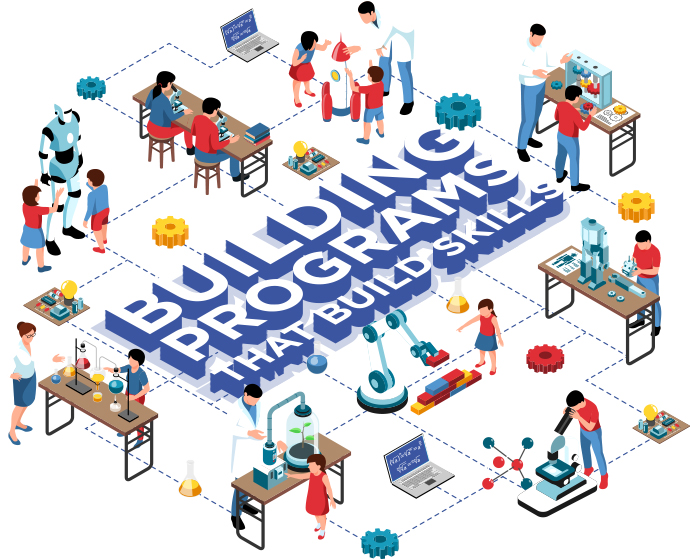Manufacturing is, understandably, the backbone of economic development. Touching each industry in unique ways, manufacturers across the country need skilled workers to meet production demands. But where do manufacturers turn to build up their own talent pipelines? For that, they turn to local community colleges.
For decades, community colleges across the country have partnered with local industry to produce the skilled talent needed to keep the country’s largest economic engine running smoothly. Though one of the smallest in the Technical College System of Georgia, Ogeechee Technical College (OTC) in Statesboro offers several game-changing programs to keep the sector’s talent pipeline full.
Innovative programs like the Full Access Training Program offer the college’s local manufacturing partners full access to the college’s industrial maintenance training capabilities for a set annual fee. Launched in January 2020, the program was an instant hit — saving its partner companies more than $300,000.
Additionally, the college is also the only in the state to be FANUC robotic training certified. Recently certified by FANUC America Corporation, the world leader in industrial robotics, as a FANUC Authorized Satellite Training (FAST) site, the college is one of only 4 in the United States and the only certified training site in the state of Georgia.
We spoke with Jan Moore, Vice President for Economic Development at OTC, about how community colleges can benefit the local manufacturing workforce.
Can you please provide an example of a successful partnership between your college and a local manufacturer?
Moore: We work very closely with Briggs & Stratton. They are the world’s largest small engine producer, the No. 1 marketer for pressure washers, and a leading manufacturer of power generation, lawn and garden turf care and job site products. There are 600 employees in the Statesboro plant, which was named Georgia’s 2019 medium-sized Manufacturer of the Year.
“Technical colleges should be the backbone of workforce development for advanced manufacturers. Working together as a group with your technical college can literally produce remarkable game-changing results.”
We also work very closely with Koyo Bearings. Koyo is the JTEKT Corporation brand for bearings. JTEKT stands at the forefront as a technological leader in the world bearing industry. They have 450 employees in their Sylvania plant, which was named 2019 International Business of the Year by the World Trade Center of Savannah.
Both companies are participants in the college’s Full Access Industrial Maintenance Training Program.
How did those partnerships come about?
Moore: Our region has a very robust industry group that has been meeting for more than 45 years. The group includes 19 manufacturers and 14 regional stakeholders. They share information with one another, seek solutions that will benefit the industry sector as a whole and work as a group with the college to determine training needs throughout the region.
That relationship has resulted in the development of unique training programs being offered by the college to its industry partners. These programs are unique to the state of Georgia and include the following:
- Full Access Industrial Maintenance Training Program (Nonacademic): Participating industries receive full access to the college’s nonacademic industrial systems (maintenance) training programs, including apprenticeships, Fast Track comprehensive industrial maintenance training program, and short courses in electrical, mechanical, motor controls, fluid power, and Programmable Logic Controllers. Companies are billed a flat annual fee and are not limited to the amount of training their employees receive.
- Manufacturing Engineering Technology Assistant 1 (META 1) and Manufacturing Engineering Technology Assistant 2 (META 2) (Academic ): Manufacturing engineering technology graduates assist engineers to design, develop, test, and manufacture mechanical devices, including tools, engines, and machines.
- FANUC Fast Site Robotics Training Lab (Nonacademic and Academic)
What should companies understand about partnering with schools like OTC to fill their workforce pipeline?
Moore: Companies should look at a comprehensive strategy when establishing pipelines to meet their workforce needs and commit to that strategy. Upskilling your existing employees via a comprehensive training program is one of those strategies that is proving to be more and more successful.
Companies should also consider their succession planning needs when working with the college.
Technical colleges should be the backbone of workforce development for advanced manufacturers. Working together as a group with your technical college can literally produce remarkable game-changing results.

